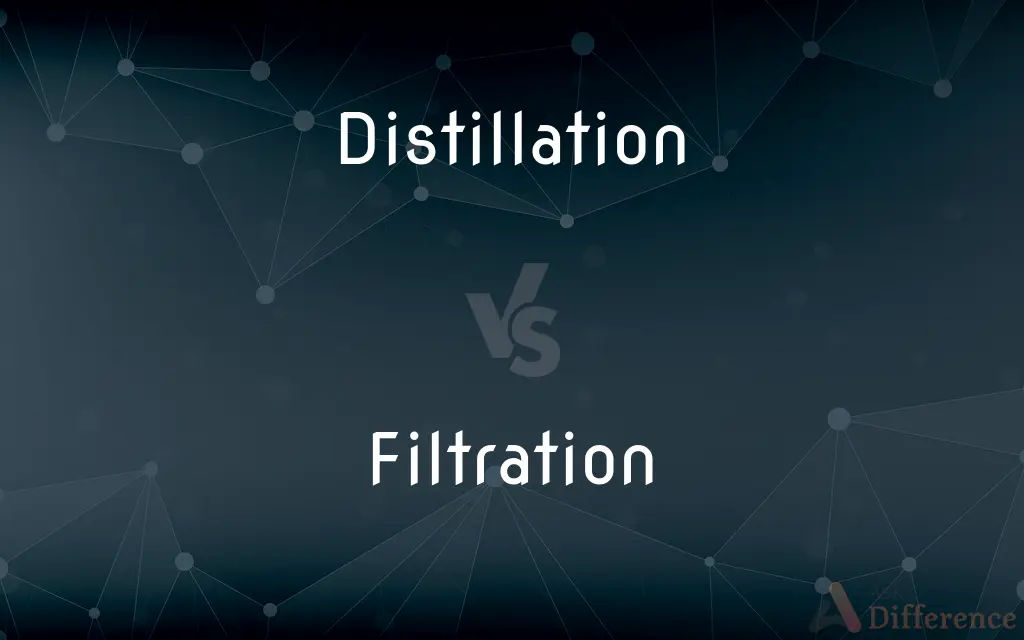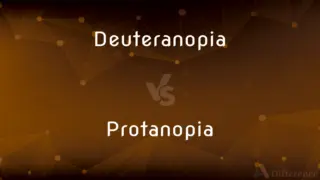Distillation vs. Filtration — What's the Difference?
By Fiza Rafique & Urooj Arif — Updated on March 19, 2024
Distillation separates substances based on boiling points, while filtration separates based on particle size.

Difference Between Distillation and Filtration
Table of Contents
ADVERTISEMENT
Key Differences
Distillation is a process used to separate components of a liquid mixture through selective boiling and condensation. It relies on differences in the boiling points of the mixture's components, making it effective for separating substances with significantly different boiling points. Filtration, on the other hand, separates solids from liquids or gases using a porous medium that allows only the fluid to pass through while retaining the solid particles. This method depends on the size of the particles and the pores of the filter medium.
In distillation, the mixture is heated until one component vaporizes, then this vapor is condensed back into a liquid form and collected. This method is commonly used in the purification of water, the production of spirits, and the separation of crude oil into various fractions. Filtration is widely used in water treatment, air purification, and the food and beverage industry to remove particulate matter from fluids.
Distillation typically involves heating the mixture and requires energy input for the phase change, whereas filtration is a mechanical separation process that may not require significant energy beyond what is needed to push the mixture through the filter.
In terms of applications, distillation is crucial in industries requiring the separation of chemicals based on their volatility, such as in the production of alcoholic beverages and in petrochemical refining. Filtration finds its significance in areas where the removal of solid impurities is essential for product quality or further processing, such as in water purification, the pharmaceutical industry, and brewing.
The choice between distillation and filtration depends on the nature of the mixture and the desired purity of the final product. While distillation is preferred for separating components with different boiling points, filtration is ideal for removing particulate matter from liquids or gases.
ADVERTISEMENT
Comparison Chart
Principle
Separates based on differences in boiling points
Separates based on particle size
Phase Change
Involves phase change (liquid to gas, then gas to liquid)
No phase change required
Energy Requirement
High (requires heating and sometimes cooling)
Low to moderate (mainly for the pressure or vacuum needed)
Applications
Purification of water, production of spirits, separation of crude oil fractions
Water treatment, air purification, removal of particulate matter in beverages
Suitability
Best for liquid mixtures with components having different boiling points
Best for separating solids from liquids or gases
Compare with Definitions
Distillation
A technique for chemical purification and analysis.
Distillation is used in laboratories to purify chemicals for research.
Filtration
Utilized in air purification systems.
HEPA filters by filtration trap airborne pollutants.
Distillation
A method to separate mixture components based on boiling points.
Distillation is used to produce ethanol by separating it from water.
Filtration
Used for sterilizing liquids in the pharmaceutical industry.
Medicines are sterilized using membrane filtration.
Distillation
Used in water purification to remove impurities.
Distillation can produce clean drinking water from seawater.
Filtration
Common in water treatment processes.
Filtration removes contaminants from drinking water.
Distillation
The process involves heating, vaporizing, and condensing components.
Through distillation, crude oil is refined into gasoline and diesel.
Filtration
A separation technique using a porous barrier to remove particles.
Filtration is used in aquariums to keep the water clean.
Distillation
Distillation, or classical distillation, is the process of separating the components or substances from a liquid mixture by using selective boiling and condensation. Dry distillation is the heating of solid materials to produce gaseous products (which may condense into liquids or solids).
Filtration
Essential in the food and beverage industry.
Coffee is made by filtration through a coffee filter.
Distillation
Essential in the production of spirits like whisky and vodka.
Distillation separates alcohol from fermented grains to produce spirits.
Filtration
Filtration is a physical or chemical separation process that separates solid matter and fluid from a mixture using a filter medium that has a complex structure through which only the fluid can pass. Solid particles that cannot pass through the filter medium are described as oversize and the fluid that passes through is called the filtrate.
Distillation
The evaporation and subsequent collection of a liquid by condensation as a means of purification:the distillation of water.
Filtration
The act or process of filtering; the mechanical separation of a liquid from the undissolved particles floating in it.
Distillation
The extraction of the volatile components of a mixture by the condensation and collection of the vapors that are produced as the mixture is heated:petroleum distillation.
Filtration
The action or process of filtering something
Small particles are difficult to remove without filtration
Distillation
A distillate.
Filtration
The act or process of filtering.
Distillation
The act of falling in drops, or the act of pouring out in drops.
Filtration
The act or process of filtering; the mechanical separation of a liquid from the undissolved particles floating in it.
Distillation
That which falls in drops.
Filtration
A totally ordered collection of subsets.
Distillation
The separation of more volatile parts of a substance from less volatile ones by evaporation and condensation.
Filtration
The process whereby fluids pass through a filter or a filtering medium
Distillation
Purification through repeated or continuous distilling; rectification.
Filtration
The act of changing a fluid by passing it through a filter
Distillation
(petroleum) Separation into specific hydrocarbon groups; fractionation.
Distillation
The substance extracted by distilling.
Distillation
The act of falling in drops, or the act of pouring out in drops.
Distillation
That which falls in drops.
Distillation
The separation of the volatile parts of a substance from the more fixed; specifically, the operation of driving off gas or vapor from volatile liquids or solids, by heat in a retort or still, and the condensation of the products as far as possible by a cool receiver, alembic, or condenser; rectification; vaporization; condensation; as, the distillation of illuminating gas and coal, of alcohol from sour mash, or of boric acid in steam.
Distillation
The substance extracted by distilling.
Distillation
The process of purifying a liquid by boiling it and condensing its vapors
Distillation
A purified liquid produced by condensation from a vapor during distilling; the product of distilling
Common Curiosities
How do distillation and filtration differ in terms of energy requirement?
Distillation requires more energy due to the need for heating and sometimes cooling, whereas filtration generally requires less energy.
Is filtration effective in removing dissolved substances from water?
Filtration is effective in removing particulate matter but not dissolved substances, which may require other processes like distillation or reverse osmosis.
What is distillation?
Distillation is a process of separating components of a liquid mixture through selective boiling and condensation.
What are some common applications of distillation?
Common applications include water purification, production of spirits, and separation of crude oil into various fractions.
What is filtration?
Filtration is a method of separating solids from liquids or gases using a filter medium that allows only the fluid to pass.
Can distillation separate solids from liquids?
Distillation is primarily used to separate components of a liquid mixture based on their boiling points and is not used for separating solids from liquids.
How does the efficiency of filtration depend on the pore size of the filter?
The efficiency of filtration depends on the match between the pore size of the filter and the size of the particles to be removed; closer matches result in higher efficiency.
Does distillation involve a phase change?
Yes, distillation involves a phase change from liquid to vapor and then back to liquid.
What are some common applications of filtration?
Filtration is used in water treatment, air purification, and removal of particulate matter in the food and beverage industry.
Can filtration separate components based on boiling points?
No, filtration separates based on particle size and is not suitable for separating components based on boiling points.
What materials are used as filters in filtration processes?
Filters can be made from various materials, including paper, cloth, activated carbon, and membrane materials, depending on the application.
Is distillation used in the food industry?
Yes, distillation is used in the food industry, particularly in the production of alcoholic beverages.
Are there any substances that cannot be separated by distillation?
Substances with very similar boiling points or azeotropes can be challenging to separate by distillation without special techniques.
What is the main difference between distillation and filtration?
The main difference is that distillation separates substances based on differences in boiling points, while filtration separates based on particle size.
Can both distillation and filtration remove bacteria from water?
Distillation can remove bacteria by boiling, whereas filtration's ability to remove bacteria depends on the pore size of the filter (e.g., microfiltration can remove bacteria).
Share Your Discovery

Previous Comparison
Flogging vs. Scourging
Next Comparison
Deuteranopia vs. ProtanopiaAuthor Spotlight
Written by
Fiza RafiqueFiza Rafique is a skilled content writer at AskDifference.com, where she meticulously refines and enhances written pieces. Drawing from her vast editorial expertise, Fiza ensures clarity, accuracy, and precision in every article. Passionate about language, she continually seeks to elevate the quality of content for readers worldwide.
Co-written by
Urooj ArifUrooj is a skilled content writer at Ask Difference, known for her exceptional ability to simplify complex topics into engaging and informative content. With a passion for research and a flair for clear, concise writing, she consistently delivers articles that resonate with our diverse audience.












































